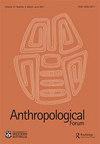Cassava Spirit and the Seed of History: On Garden Cosmology in Northern Amazonia
IF 0.7
3区 社会学
Q3 ANTHROPOLOGY
引用次数: 7
Abstract
ABSTRACT This article concerns the practice of cassava gardening among the indigenous Makushi people of Amazonian Guyana. By focusing on the cassava garden (mîî) as a primary site of multispecies engagement, I explore some of the heterogeneous modes that people–plant relationships take in everyday life and ritual practice. Plants, for the Makushi, are typically thought of as ‘persons’ (pemon), and gardening is predicated upon maintaining relationships of interspecies care via regular human–plant communication. In the idiom of human kinship, cassava plants are spoken of as being ‘children’ (more yamî’), both of human gardeners and Cassava Mama, the tutelary spirit of cultivated plants. Human–plant communication is both verbal, in the form of poetic language (taren) and songs (eremu), and embodied, in the form of tactile engagement and substance-based transfers. It is in the cultivation of communicative relationships with plants and their spirits, I argue, that Makushi gardeners create and nourish human persons and, ultimately, reproduce society through relations with alterity. I go on to address the anthropological problem of plant animism in Amazonia, arguing that a more embodied, sensorial and, following Strathern, ‘immanentist’ notion of spirit is required to better account for the complex entanglement of bodies and souls that undergirds human–plant interpenetration in indigenous Amazonia. In dialogue with literature from the multispecies turn, I suggest that an anthropology beyond the human, much like Makushi gardening, might usefully be thought of as a process of more-than-human ontogenesis.木薯精神与历史的种子:北亚马逊地区园林宇宙论
这篇文章是关于亚马逊圭亚那土著马库什人的木薯园艺实践。通过关注木薯花园(mîî)作为多物种参与的主要场所,我探索了日常生活和仪式实践中人与植物关系的一些异质模式。对于Makushi来说,植物通常被认为是“人”(pemon),园艺是建立在通过定期的人与植物交流来维持物种间关怀关系的基础上的。在人类亲缘关系的习语中,木薯植物被称为“孩子”(更多yamî),既是人类园丁,也是木薯妈妈,栽培植物的守护神。人类与植物之间的交流既以诗歌语言(taren)和歌曲(eremu)的形式进行口头交流,也以触觉接触和基于物质的转移的形式进行具体化。我认为,正是在培育与植物及其精神的交流关系中,Makushi园丁创造和滋养了人类,并最终通过与另类的关系再生产了社会。我接着讨论了亚马逊地区植物万物有灵论的人类学问题,认为需要一种更具体化的、感官的、遵循斯特拉森的“内在论”的精神概念,以更好地解释在亚马逊土著地区支撑人类与植物相互渗透的身体和灵魂的复杂纠缠。在与多物种转向的文学的对话中,我建议超越人类的人类学,就像马库西园艺一样,可能被认为是一个超越人类个体发生的过程。
本文章由计算机程序翻译,如有差异,请以英文原文为准。
求助全文
约1分钟内获得全文
求助全文
来源期刊

Anthropological Forum
ANTHROPOLOGY-
CiteScore
3.60
自引率
10.00%
发文量
14
期刊介绍:
Anthropological Forum is a journal of social anthropology and comparative sociology that was founded in 1963 and has a distinguished publication history. The journal provides a forum for both established and innovative approaches to anthropological research. A special section devoted to contributions on applied anthropology appears periodically. The editors are especially keen to publish new approaches based on ethnographic and theoretical work in the journal"s established areas of strength: Australian culture and society, Aboriginal Australia, Southeast Asia and the Pacific.
 求助内容:
求助内容: 应助结果提醒方式:
应助结果提醒方式:


